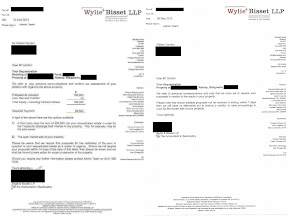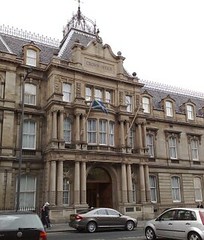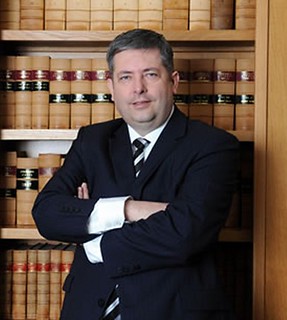 ‘We’re in the money’ - Quiet unassuming office of Wylie & Bisset in Glasgow, who receive millions from public funds for pursuing sequestration cases. WYLIE & BISSET LLP, a firm of accountants in Glasgow who act as agents for the Accountant in Bankruptcy and were recently featured in media reports after having threatened seizure of properties to pay off alleged debts to Perth Law firm Kippen Campbell, are revealed today to have received OVER TWO MILLION POUNDS of taxpayers money since April 2009, according to information released from the AIB in response to a Freedom of Information request.
‘We’re in the money’ - Quiet unassuming office of Wylie & Bisset in Glasgow, who receive millions from public funds for pursuing sequestration cases. WYLIE & BISSET LLP, a firm of accountants in Glasgow who act as agents for the Accountant in Bankruptcy and were recently featured in media reports after having threatened seizure of properties to pay off alleged debts to Perth Law firm Kippen Campbell, are revealed today to have received OVER TWO MILLION POUNDS of taxpayers money since April 2009, according to information released from the AIB in response to a Freedom of Information request.
The AIB admitted in their Freedom of Information disclosure, available to view online HERE : I can confirm that Wylie & Bisset are one of six Providers, who were appointed to administer cases on behalf of the Accountant in Bankruptcy under an Agency Framework Agreement. This contract commenced on 1 April 2009.
Since the commencement of this contract in April 2009, until 31 March 2012, Wylie & Bisset have been paid £2,066,686.50, for the administration of cases on behalf of The Accountant in Bankruptcy.
Since Scottish Law Reporter originally covered the case of a Mr William Gordon, of Perth, who was threatened by Wylie & Bisset in an attempt to seize his home (which he does not own) and the property of another Mr Gordon in Blairgowrie to pay off Perth lawyers Kippen Campbell, it now transpires the Glasgow based accountants also froze Mr Gordon’s Disability Living Allowance benefit payments for at least FOUR MONTHS, reported by popular Scots law blog “Diary of Injustice”, HERE
However, inquiries made by journalists for Scottish Law Reporter today reveal that Wylie & Bisset have again, seized Mr Gordon’s bank accounts at Lloyds TSB in Perth, blocking his access to his Disability Living Allowance payments, in what appears to be an attempt to starve him out.
The Freedom of Information response from the Accountant in Bankruptcy also reveals Wylie & Bisset have been implicated in at least EIGHTEEN COMPLAINTS made about the way in which they handle cases allocated to them by the Accountant in Bankruptcy’s multi million pound office in Kilwinning, although the AIB did not disclose outcomes of complaints or the exact subject & sums of money involved in the complaints.
The AIB finally admitted there were complaints made against Wylie & Bisset, their response stated : “I can confirm that there have been 18 complaints made to AiB in respect of Wylie & Bisset, from 1 April 2009 to date, 27 July 2012. These complaints were on a variety of issues, not necessarily on the conduct of Wylie & Bisset or their administration of cases and included matters relating to the general bankruptcy process which is governed by legislation.”
However, the AIB attempted to explain away any concern caused by the levels of complaints, claiming the complex nature of work performed by Wylie & Bisset, at massive public expense, made it likely errors would occur.
The AIB’s response claimed : The administration of sequestrations is a complex task where a range of information is obtained from various sources. During this process it is possible for errors to occur, though the Accountant in Bankruptcy is satisfied that our Providers give a consistently high standard of service when acting on our behalf
Any errors made during the administration of a case are not routinely recorded. In the event that an error is identified, the matter would be handled by the Provider. Any issues that arise are reviewed and immediate steps are taken to correct the error and to ensure that lessons are learned to prevent repetition. The AiB Contract Operations Team is responsible for auditing the work of our Providers to ensure that quality standards are maintained. Any complaints made against our Providers are recorded by Accountant in Bankruptcy’s Contract Operations Team and the Provider.
The AIB finally admitted there were complaints made against Wylie & Bisset, their response stated : “I can confirm that there have been 18 complaints made to AiB in respect of Wylie & Bisset, from 1 April 2009 to date, 27 July 2012. These complaints were on a variety of issues, not necessarily on the conduct of Wylie & Bisset or their administration of cases and included matters relating to the general bankruptcy process which is governed by legislation.”
It was also admitted some 3703 cases had been given to Wylie & Bisset although legal experts said the vast majority of work done in these cases would be minimal, given the nature of sequestrations and the unlikelihood of repayment particularly in the current financial downturn.
Speaking to Scottish Law Reporter earlier today, a legal insider said he was surprised about the amount of public money being handed over to private accountancy firms such as Wylie & Bisset while the AIB has such a high headcount of staff, particularly many accountants paid out of more public funds. The operational budget for the Accountant in Bankruptcy in 2012-2013 as listed in their yearly ‘business plan’ is nearly FIFTEEN MILLION POUNDS.
The insider said : “I wonder how much of this multi million pound spending spree on private accountants & law firms accounts for the burgeoning budget of the AIB. It seems to me their sums don't add up.”
Wylie & Bisset – Your house or someone else’s house to pay your ex lawyers fees :
 Threatening letters – Pay up for lawyers fees or we make you homeless say AIB’s agents. In letters sent to Mr Gordon, Wylie & Bisset demand a “required payment” of NINETY TWO THOUSAND & FIVE HUNDRED POUNDS, and goes on to threaten “We require firm proposals for the realisation of the sum in question to your sequestrated estate as a matter of urgency. Should we not receive your proposals within 14 days of the date of this letter, then please be aware that we shall be forced to seek action for vacant possession of the property.”.
Threatening letters – Pay up for lawyers fees or we make you homeless say AIB’s agents. In letters sent to Mr Gordon, Wylie & Bisset demand a “required payment” of NINETY TWO THOUSAND & FIVE HUNDRED POUNDS, and goes on to threaten “We require firm proposals for the realisation of the sum in question to your sequestrated estate as a matter of urgency. Should we not receive your proposals within 14 days of the date of this letter, then please be aware that we shall be forced to seek action for vacant possession of the property.”.
The property which Wylie & Bisset were attempting to seize and had valued, at £185,000, was located in Rattray, Blairgowrie, and owned by a family unconnected to Mr Gordon. Yet the debt allegedly owed to the Perth based law firm amounted to little more than £2,700, which now appears to have increased to some £6,600 taking into account several hearings at Perth Sheriff Court which have artificially inflated the original demand for the disputed legal fees.
Another demand sent to Mr Gordon from Wylie & Bisset, just a few days after the earlier threat, stated : “Please note that should suitable proposals not be received in writing, within 7 days, then we will have no alternative but to instruct a solicitor to raise proceedings in court for the forced sale of your property.”







